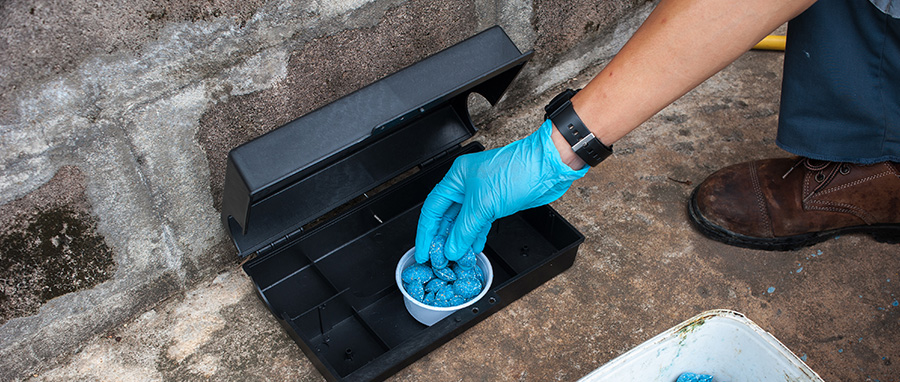If you have a problem with rats or mice, you want to get rid of them fast. While your initial reaction may be to head to the department store and pick up some snap traps, will that actually help eliminate the infestation? Here, the experts at Eden Advanced Pest Technologies discuss whether or not rodent traps are effective and provide tips on how you can quickly get rid of rats or mice.
Can Rat Traps Get Rid Of An Infestation?
While rodent traps do kill rats and mice, they’re rarely effective against an infestation. These pests are very smart, and haphazardly placing traps around your property won’t do much against a colony—even if they do catch a rodent or two.
In order to get the most out of your rat traps, you need to follow these steps:
1. Get The Right Type of Rodent Trap
It’s essential to recognize that not all rodent traps are created equal. Understanding the different types of traps and their effectiveness is crucial for effectively managing rodent populations in your home or property. Here are the most common types on the market and how they work:
- Snap Traps: Snap traps are one of the most traditional and widely recognized types of rodent traps. These devices consist of a spring-loaded mechanism designed to snap shut when triggered by a rodent. While snap traps can be effective at catching individual rodents, they require careful placement and monitoring to ensure success. Additionally, snap traps can be considered humane if used correctly, providing a quick and relatively painless means of dispatching rodents.
- Glue Traps: Glue traps, also known as adhesive traps, rely on a sticky adhesive surface to capture rodents as they attempt to cross the trap. While glue traps are inexpensive and easy to use, they have been subject to controversy due to concerns about animal welfare. Rodents caught on glue traps may suffer prolonged distress and discomfort before succumbing to exhaustion or starvation. Furthermore, larger rodents may escape from glue traps by tearing themselves free, rendering the trap ineffective.
- Live Traps: Live traps offer a more humane approach to rodent control by capturing rodents alive for later release. These traps typically consist of a cage or box with a trigger mechanism that closes the door once activated by the rodent. While live traps allow for the relocation of captured rodents to a more suitable habitat, they may not be as effective as lethal traps in reducing rodent populations, especially in cases of severe infestations.
- Electronic Traps: Electronic traps utilize technology to deliver a lethal shock to rodents upon entry. These traps are designed to be quick and efficient, often delivering a high-voltage shock that kills rodents instantly. While electronic traps can be effective at eliminating individual rodents, they may be more expensive than traditional traps and require batteries or a power source to function.
2. Place The Traps Properly
Traps can only fulfill their intended purpose when strategically positioned where rodents are likely to frequent. Rodents typically follow specific travel routes and exhibit neophobic behaviors, avoiding unfamiliar or exposed areas. They also learn quickly, so traps that once worked may not be helpful long-term.
To get the most out of your traps, you need to know where rats and mice are actually wandering. Watch their behavior and look for signs of activity such as:
- Droppings
- Gnaw marks
- Nesting materials
Are Bait Stations Better Than Traps?
While traditional rodent traps directly target individual rodents, bait stations offer a more proactive and systematic approach to controlling infestations. Bait stations are enclosed containers that hold rodenticide baits, enticing rodents to enter and consume the toxic bait.
Unlike traps, which rely on rodents triggering a mechanism to capture or kill them, bait stations attract rodents with food, allowing them to ingest lethal doses of poison. Bait stations provide several advantages over traps, including the ability to target multiple rodents simultaneously and the potential to address hidden or widespread infestations more effectively.
How To Get Rid Of Rodents
While traps are effective at capturing individual rodents, implementing exclusion methods is essential for preventing future infestations and ensuring long-term rodent control. Incorporating exclusion measures alongside trapping efforts not only enhances the efficacy of rodent control but also addresses the underlying cause of the infestation. Ways you can get rid of rats and mice long-term include:
- Seal cracks and gaps in walls, floors, and foundations using caulk.
- Install door sweeps and thresholds to block entry points under doors.
- Repair damaged screens on windows and vents to prevent rodent entry.
- Trim vegetation and eliminate clutter around buildings to remove hiding spots.
- Store food in airtight containers and maintain cleanliness.
- Use hardware cloth or wire mesh to cover vents and openings in roofs and walls.
Professional Rodent Control in Spokane, WA and Coeur d'Alene, ID
When it comes to dealing with stubborn rodent infestations, professional intervention offers the most effective solution for long-lasting results. At Eden Advanced Pest Technologies, our team of experienced pest control experts specializes in comprehensive rodent management strategies tailored to your specific needs.
From thorough inspections to targeted treatments and ongoing monitoring, we employ the latest techniques and technologies to eradicate rodents and prevent future infestations. Give us a call today to get started!
Back to Rat & Mice Exterminators, Control & Removal

